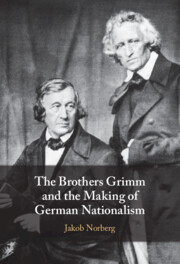3 results
Chapter 2 - Folk Hatred and Folktales
-
- Book:
- The Brothers Grimm and the Making of German Nationalism
- Published online:
- 07 April 2022
- Print publication:
- 14 April 2022, pp 51-84
-
- Chapter
-
- You have access
- Open access
- HTML
- Export citation

The Brothers Grimm and the Making of German Nationalism
-
- Published online:
- 07 April 2022
- Print publication:
- 14 April 2022
-
- Book
-
- You have access
- Open access
- Export citation
2 - The Romantic “Big Bang”
-
- Book:
- The Origins of Early Christian Literature
- Published online:
- 23 January 2021
- Print publication:
- 28 January 2021, pp 50-104
-
- Chapter
- Export citation


